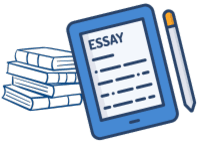You Can Read our FREE Guide on IDS 100 5-1 Discussion: Attributions and Academic Integrity and its solution as well.
Instructions of IDS 100 5-1 Discussion
Overview
In this discussion, we will explore attributions and academic integrity. These two topics are fundamental to this course and throughout your time at SNHU.
Create one initial post and follow up with at least two response posts.
For your initial post, address the following:
Why is the attribution of works important?
How would you define plagiarism? How is it different from sharing someone else’s post, word for word, on social media?
Has anyone plagiarized your work? How did you react? If you have not experienced someone plagiarizing your work, how would you respond if someone had?
For your response posts, address the following:
How is your assessment of attribution different from that of your peers?
What contribution can you make to your peer’s post regarding plagiarism?
To complete this assignment, review the Discussion Rubric.
Step-By-Step Guide IDS 100 5-1 Discussion: Attributions and Academic Integrity
Introduction to IDS 100 5-1 Discussion
In IDS 100 5-1 Discussion: Attributions and Academic Integrity, we delve into the critical concepts of attributions and academic integrity, which form the cornerstone of our liberal arts education. Understanding why attribution matters and recognizing the nuances of plagiarism are essential skills for academic and professional success.Why is the attribution of works important?
Why is Attribution of Works Important?
To start the IDS 100 5-1 Discussion: Attributions and Academic Integrity, we will discuss why the attribution of work is important.- Start by understanding the significance of giving credit to the original creators of ideas, concepts, and works.
- Consider the ethical implications of failing to attribute sources in academic and professional contexts.
- Reflect on how proper attribution fosters a culture of respect for intellectual property and promotes academic honesty.
- Provide examples of situations where accurate attribution enhances credibility and strengthens arguments.
Example
Understanding why attribution of works is important is crucial in academic and professional settings. It signifies giving credit to original creators, ensuring ethical conduct. Failing to attribute sources can have ethical implications, undermining the integrity of one’s work. Proper attribution cultivates a culture of respect for intellectual property, upholding academic honesty. Examples abound where accurate attribution enhances credibility and bolsters arguments, demonstrating the significance of acknowledging the contributions of others in scholarly discourse.
How would you define plagiarism? How is it different from sharing someone else’s post, word for word, on social media?
Defining Plagiarism
Next, we will define plagiarism and also discuss how plagiarism is different on social media.- Define plagiarism as presenting someone else’s work, ideas, or words as your own without proper attribution.
- Emphasize the distinction between plagiarism and sharing someone else’s post verbatim on social media platforms, where the context and purpose differ.
- Explore the implications of plagiarism in academic settings, including potential consequences such as academic penalties and damage to reputation.
- Encourage critical thinking about the ethical considerations involved in both scenarios.
Example
Plagiarism is presenting someone else’s work, ideas, or words as your own without proper attribution. This academic misconduct undermines the integrity of scholarly discourse and can lead to severe consequences, such as academic penalties and damage to one’s reputation. It is crucial to differentiate plagiarism from sharing someone else’s post verbatim on social media platforms. While both involve using another’s work, plagiarism lacks proper attribution and violates ethical norms. Sharing on social media, however, often serves different purposes and contexts, such as spreading information or expressing solidarity, where attribution may not always be necessary. Understanding these distinctions fosters critical thinking about ethical considerations in academic and online environments.
Has anyone plagiarized your work? How did you react? If you have not experienced someone plagiarizing your work, how might you respond if someone had?
Personal Experience with Plagiarism
This section of IDS 100 5-1 Discussion: Attributions and Academic Integrity will discuss our personal experiences with plagiarism and how we reacted to it.- Reflect on personal experiences, if any, with encountering plagiarism in your work.
- Consider your emotional and professional reactions to plagiarism, whether directed at you or observed by others.
- Discuss strategies for addressing plagiarism constructively, including communication with the plagiarizer and seeking assistance from instructors or academic support services.
- Explore hypothetical scenarios to prepare for future encounters with plagiarism and develop proactive responses.
Example
Reflecting on encounters with plagiarism is an integral aspect of academic growth. While fortunate to have not experienced direct plagiarism, I empathize with those who have. Witnessing such academic dishonesty elicits disappointment and undermines our scholarly community’s integrity. Communication with the plagiarizer is key to addressing plagiarism constructively, emphasizing the importance of academic honesty and providing guidance on proper citation practices. Additionally, seeking assistance from instructors or academic support services ensures fairness and upholds academic standards. Preparing for future encounters involves developing proactive responses, such as promoting awareness of plagiarism and fostering a culture of integrity within our academic circles.
How is your assessment of attribution different from that of your peers? What contribution can you make to your peer’s post regarding plagiarism?
Peer Response
Responding to peers is one of the vital parts of the IDS 100 5-1 Discussion: Attributions and Academic Integrity. We need to provide at least two peer responses. I will provide one example post. You can write your peer responses by keeping the below points in mind.- Compare and contrast your understanding of attribution with your peers, considering different perspectives and interpretations.
- Provide constructive feedback on your peer’s post regarding their assessment of plagiarism, highlighting strengths and offering suggestions for improvement.
- Engage in respectful dialogue by acknowledging differing viewpoints and offering insights based on personal experiences or additional research.
- Foster a collaborative learning environment by encouraging further exploration of attribution and academic integrity through meaningful discussions and reflections.
Example
Response 01 In comparing our understanding of attribution, I’ve noticed slight differences in emphasis. While we both recognize the importance of crediting original creators, my focus leans towards the ethical implications and fostering a culture of respect. Regarding plagiarism assessment, your post effectively defines plagiarism and discusses its implications. To enhance it further, consider elaborating on strategies for addressing plagiarism constructively, such as promoting awareness and providing resources for proper citation practices. Engaging in respectful dialogue enriches our collective understanding of academic integrity.





